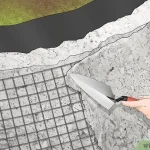Building a small crawfish pond can be a rewarding and enjoyable project for those interested in aquaculture or simply looking to create a unique and sustainable ecosystem on their property. Crawfish, also known as crayfish, are freshwater crustaceans that are not only fun to observe but can also be a great source of food if managed properly.
Step 1: Selecting the Site
When choosing a location for your crawfish pond, it’s essential to consider factors such as sunlight exposure, soil quality, and accessibility to a water source. Crawfish thrive in shallow, muddy areas with access to freshwater, so look for a spot on your property that meets these criteria.
Step 2: Digging the Pond
Once you have identified the site, it’s time to start digging the pond. The size of the pond will depend on how many crawfish you plan to raise and the available space on your property. Use a shovel or a small excavator to dig the pond to a depth of about 1 to 2 feet.
Step 3: Installing a Liner
To prevent water from seeping into the surrounding soil, it’s important to install a pond liner. You can use a rubber pond liner or a thick plastic sheet to line the bottom and sides of the pond. Make sure the liner is secure and free of any tears or holes.
Step 4: Filling the Pond with Water
Once the liner is in place, fill the pond with freshwater. You can use a garden hose or connect the pond to a nearby water source. Make sure the water level is sufficient to cover the bottom of the pond and provide a suitable habitat for the crawfish.

Credit: www.youtube.com
Step 5: Adding Rocks and Plants
Crawfish are known to be scavengers and will feed on a variety of organic matter. To create a natural habitat for the crawfish, consider adding rocks, driftwood, and aquatic plants to the pond. These elements will not only provide shelter for the crawfish but also help maintain water quality.
Step 6: Introducing Crawfish
Once the pond is set up and ready, it’s time to introduce the crawfish. You can purchase crawfish from a local supplier or catch them in nearby bodies of water. Release the crawfish into the pond and allow them to acclimate to their new environment.

Credit: www.wikihow.com
Step 7: Feeding and Maintenance
To ensure the health and growth of your crawfish, it’s important to feed them regularly. Crawfish will eat a variety of foods, including commercial pellets, vegetables, and even small fish. Monitor the water quality and temperature of the pond and make any necessary adjustments to keep the crawfish healthy.
Step 8: Harvesting Crawfish
Depending on the species of crawfish you are raising, they can take anywhere from a few months to a year to reach maturity. Once the crawfish have grown to a suitable size, you can harvest them for consumption. Use a net or trap to catch the crawfish and enjoy the fruits of your labor!
Conclusion
Building a small crawfish pond can be a fun and rewarding project that allows you to create a sustainable ecosystem right in your backyard. By following these steps and providing the proper care and maintenance, you can enjoy watching your crawfish thrive and even harvest them for a delicious meal.


